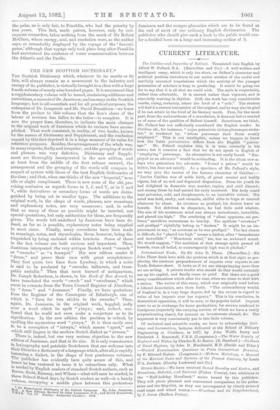CURRENT LITERATURE.
The Catiline and Tugurtha of Sallust. Translated into English by Alfred W. Pollard, B.A. (Macmillan and Co.)—A well-written and intelligent essay, which is only too short, on Ballast's character and political position introduces to our notice another of the useful and carefully executed translations which the activity of the younger generation of scholars is busy in producing. It would be going too far to say that it is all that we could wish. The style is respectable, rather than admirable. It is correct rather than vigorous, and is especially wanting in rhythm. Still, the work has very considerable merits, rising, certainly, above the level of a " crib." The student will find it a correct interpreter of the original, and he may also be glad if lie can attain to the level of its literary merit. Free, for the most part, from the awkwardness of a translation, it does not fail to remind us of some of the qualities of Sallust himself. Sometimes, we think, Mr. Pollard has not sufficiently considered the English reader. In Catiline xli., for instance, " cujus patrocinio eivitas plernmque uteba- tur," is rendered by, " whose patronage their State mostly employed." This is not intelligible, unless we happen to know how the Latin patrocinium differs from the English "patron-
age." Mr. Pollard explains this, it is true, correctly in his notes; but it remains a fact that we do not speak in English of "employing" patronage. An alternative is not easily found. "Em- ployed as an advocate" would be misleading. It is the client now-a- days who patronises the advocate. "Found a patron" would be better, but does not satisfy. As a specimen of Mr. Pollard's style, we may give the version of the famous character of Catiline :— " Lucius Catilino, was of noble birth, of great mental and bodily vigour, but of an evil and depraved disposition. From his youth he had delighted in domestic, war, murder, rapine, and civil discord; and among these he had passed his early manhood. His body could bear privation, cold, and sleeplessness, to an incredible extent. His mind was bold, crafty, and versatile, skilful alike to feign or conceal whatever he chose. As covetous as prodigal, his desires knew no bounds. Not deficient in eloquence, he had little solid wisdom. The aim of his monstrous mind was always immoderate, incredible, and placed too high." The rendering of " alieni appetens, sui pro- fuses," sacrifices correctness to brevity. Tho epithets "covetous" and prodigal" rightfully belong to " desires." It might be an im- provement to say, " as covetous as he was prodigal." The last clause is difficult, for "placed too high" seems a bathos, after "immoderate and incredible." "Monstrous mind," too, has an awkward sound. We would suggest, " The ambition of that strange spirit passed all bounds, even all belief, so extravagantly high was it pitched."






























 Previous page
Previous page